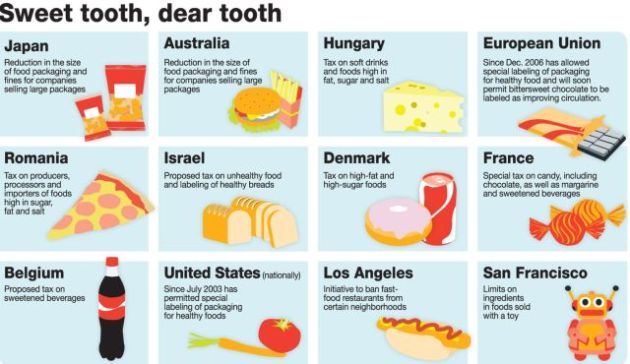Most people around the globe would agree that the United States of America has a serious problem when it comes to over-eating. According to the Center for Disease Control and Prevention, one out of every three Americans is obese, or has a much greater amount of body fat than is considered healthy for a given weight (CDC). In 2008, twelve percent of the world’s adults aged twenty and above were considered to be obese (World Health Organization). The United States’ population more than doubles Earth’s average fat rate, and we do not have to search far to find the culprits. A combination of lack of exercise and excessive food intake contribute enormously to this country’s unhealthy status, and not much has been done to fight it. Luckily, there is one solution that can combat the fat factor of the U.S. along with the rest of the world’s perception of its citizens’ health: raising taxes on junk food.
Now, I know what comes to mind whenever a new tax is discussed: the government already taxes everything in the country; adding another one will only take more money away from citizens. Not all citizens could afford to live with a junk food tax anyway; most people in the lower socioeconomic status depend on the low costs of junk food to feed themselves and their families. The United States does not need the government to tell it what it can and cannot consume, for junk food is after all, food, and people cannot live without sustenance. I cannot argue with the validity of the idea that taxing junk food is not ideal for certain groups of people in the country. Even more, the purpose of combatting obesity would not entirely help, for obesity is caused by a lack of portion control, exercise, and genetics as well. The mere task of deciding what to tax is in itself extremely difficult, and it would be hard to get congressmen to agree on a list of millions of items considered to fit in the junk food category.
However, we can endeavor to define what fits under ‘junk food.’ Webster’s Dictionary defines junk food as “food that is high in calories but low in nutritional value,” (Webster’s Dictionary). This rather broad description can be narrowed down even further to include foods that are high in fat, sugar, sodium, and empty calories. When the ‘calories from fat’ count significantly bypasses the “good stuff,” like nutritional calories, protein, and vitamins, the food definitely cannot be considered healthy. Foods like these unarguably fit perfectly into the junk food category.
The word ‘tax’ has negative connotations wherever it appears, simply because people do not want to give away any more of their hard-earned income, and especially when it goes to paying for the welfare of people who do not work hard and take care of themselves. Ultimately, money included in the junk food tax would still end up in the Medicare fund, but the tax itself would fight the amount of people who require such heavy bills to be paid by the public. The junk food tax increases prices on unhealthy food, ideally pushing consumers to purchase healthier options. When people eat the healthier foods, obesity rates will lower and theestimated annual medical cost of obesity in the U.S. of $147 billion dollars (CDC) will drop significantly. Think about it, even if the obesity rate were to drop by just ten percent due to the junk food tax, the United States and taxpayers as a whole will save almost fifteen billion dollars per year.
Installing a junk food tax on the United States would contribute to many other benefits as well as tax dollars spent on useful projects rather than obesity healthcare. The country would be healthier, and not just the people who spend less on junk food. When obesity is combated, production in the workplace is increased, for workers with obesity do not function physically as well as people with healthier bodies, so companies around the nation would see increased labor. Stores and fast food restaurants would see a change if their products were taxed more, but they would also be forced to introduce healthier options available for purchase. With a new high demand for healthier food, production of healthy nutrition would increase tenfold, resulting in lowered prices for what was before the most expensive food on the market. With the prices of fatty and nutritional foods reversed, all classes of U.S. society would have available to them the nutrition that they need to flourish, fitting the needs of budget-families across the nation.
When an option to boost a person’s health arises, and it does not require much work, it would be foolish for the person to continue living as they were. It is the same with a country; the United States is in dire need of a diet, and when the simple solution of placing a tax on the very items that harm the country’s health is so easily within reach, why should we not try it?



Very well written! I liked how you defended your side, but I didn’t really see much development for the opposition of the tax in your paper. You gave a lot of really good reasons why the tax should be implemented, and they all make sense. Maybe try spelling out exactly how much the tax would be and on which specific foods? Overall, though, it’s a very compelling argument!
your essay is very good and the essay does follow the Rogerian format. i really have nothing to add to this essay, i think you have everything you need but you could put in actual heights and weight to show what you are supposed to weigh at a certain height. i know if you are my height which is 5’4 your considered over weight if you don’t weigh between 130 and 140 pounds.